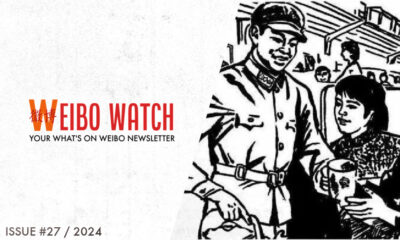China Memes & Viral
Japanese Gold Medalist Becomes a Meme in China after Controversial Men’s Gymnastics All-Around
Weibo’s Olympic meme machine has begun!
Published
3 years agoon

The Olympic Games are in full swing and Chinese social media users are building on their meme collections as online discussions are getting more intense on Weibo – especially when it comes to competitions between China and Japan.
Japanese athlete Daiki Hashimoto (橋本 大輝) won the gold for men’s gymnastics individual all-around on the sixth day of the Tokyo Olympics. China’s Xiao Ruoteng (肖若腾), who had been leading the competition in the first five rotations, claimed the silver medal after the team’s inquiry over his score of 14.066 in the last rotation was rejected.
Online discussions arose as videos and pictures of Hashimoto’s landing pose in the vaulting event were shared by some netizens on Weibo, questioning if Hashimoto deserves a score of 14.7 as he failed to end with a stable landing.
A video made by Shanghai Oriental Sports Daily compares the performances of the two athletes and shows how the scoring leaves people confused; the two gymnasts performed the same routine and ended in completely different poses (land firmly vs. stumble while landing and stepping out of line), yet they only had a score difference of 0.166.
Some Chinese gymnasts also posted on Weibo and hinted at the scoring controversy.
Li Xiaopeng (李小鹏), the male gymnast who currently holds 16 world titles, called the result “a pity” in a Weibo post published on July 28. He wrote: “Congratulations on the second place. The fact is not that I do not understand [the game] – it’s that I understand it all too well.”

Gymnast Chen Yibing (陈一冰), four-time world champion on still rings who himself experienced disputed scoring at the 2012 Summer Olympics, wrote: “No matter what the result is, Sun Wei and Xiao Ruoteng are perfect! Xiao Ruoteng IS the champion.”
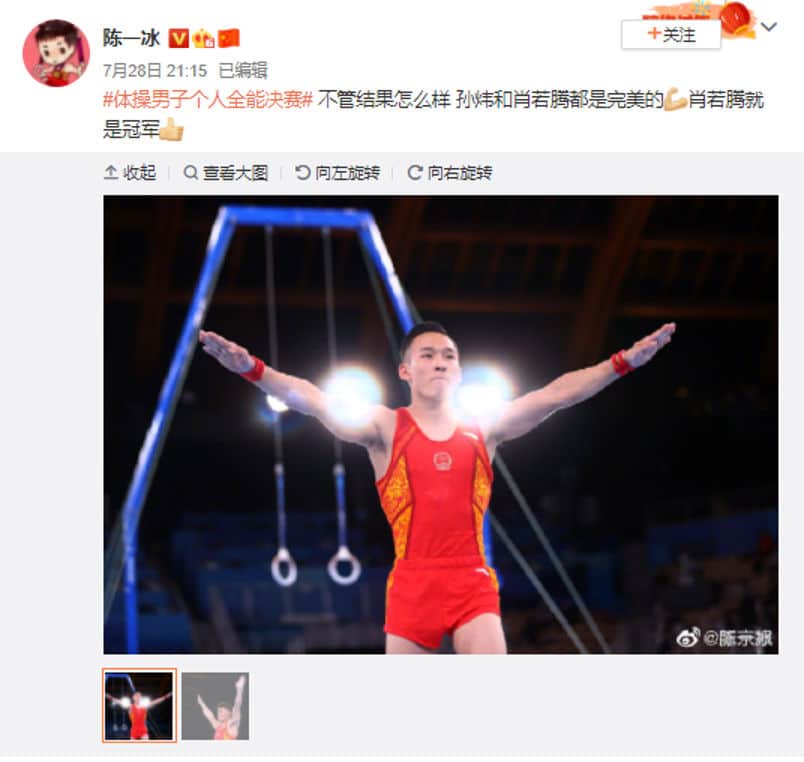
More than 10 related hashtags appeared in the top 30 of Weibo’s top search list after the competition, even though it was already late at night in China. The hashtag relating to the judges of the Olympic gymnastics (#体操裁判#) received about 640 million views.
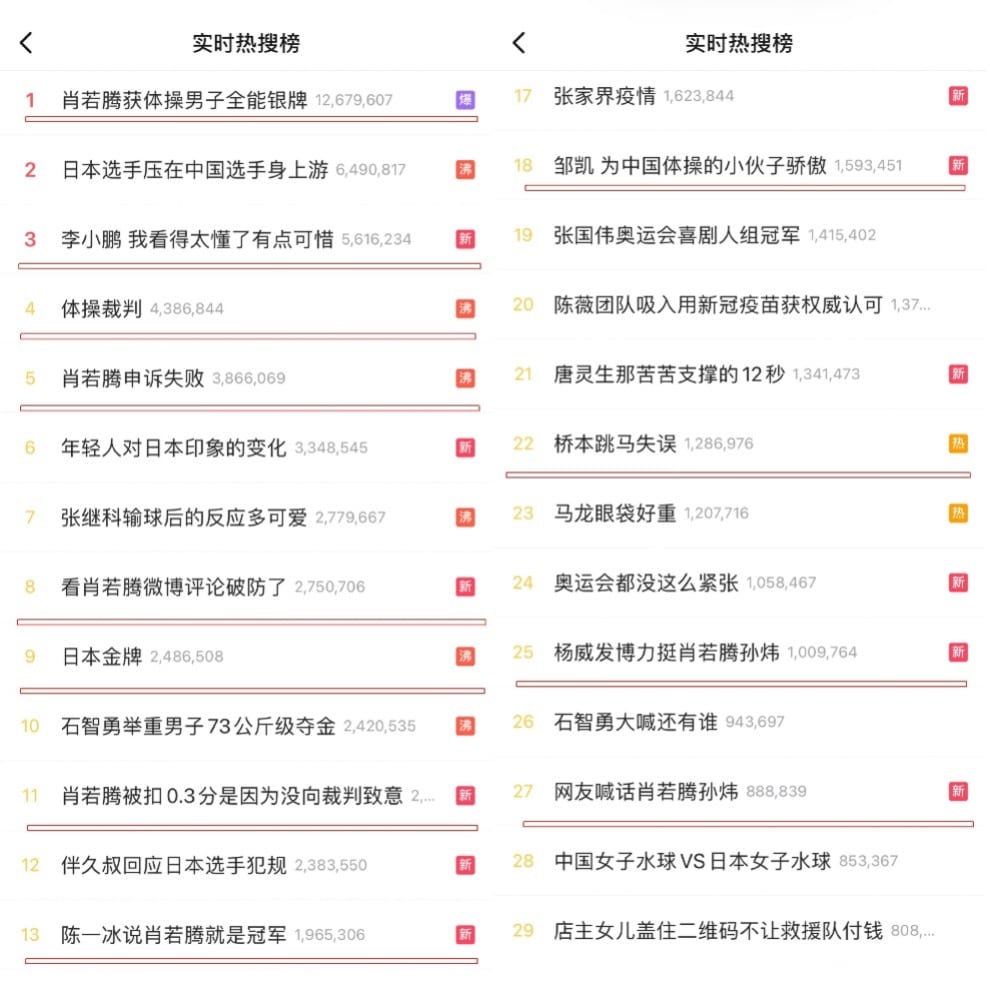
A screenshot of the Weibo’s trending list at Beijing Time 11:15 pm on July 28, showing 12 hashtags related to the competition of Men’s Gymnastics Individual All-Around.
Online discussions on the controversial gymnastics’ scoring then shifted, setting off a wave of content creation. Some memes mocking the new champion’s landing pose in the event of vault went viral on Weibo.
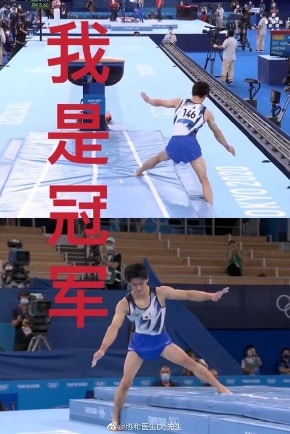
“I am the champion”
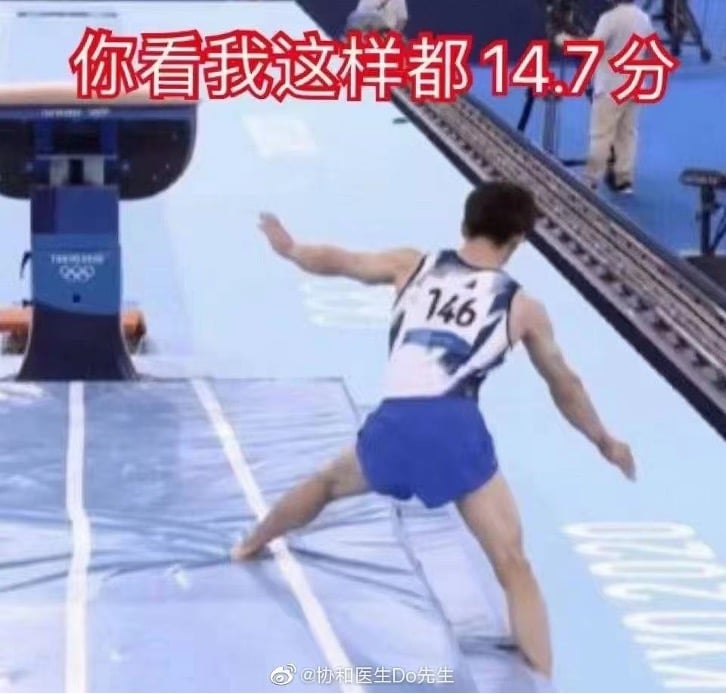
“See, I got 14.7 points with this.”
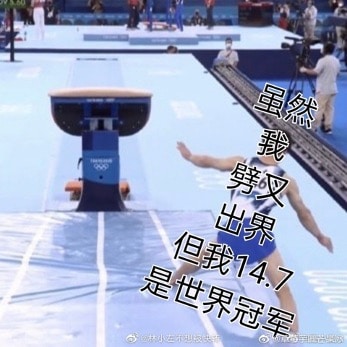
“I split, I step out of line, but I got 14.7 and I am the world champion.”

“Let me go down and pick up a gold medal.”
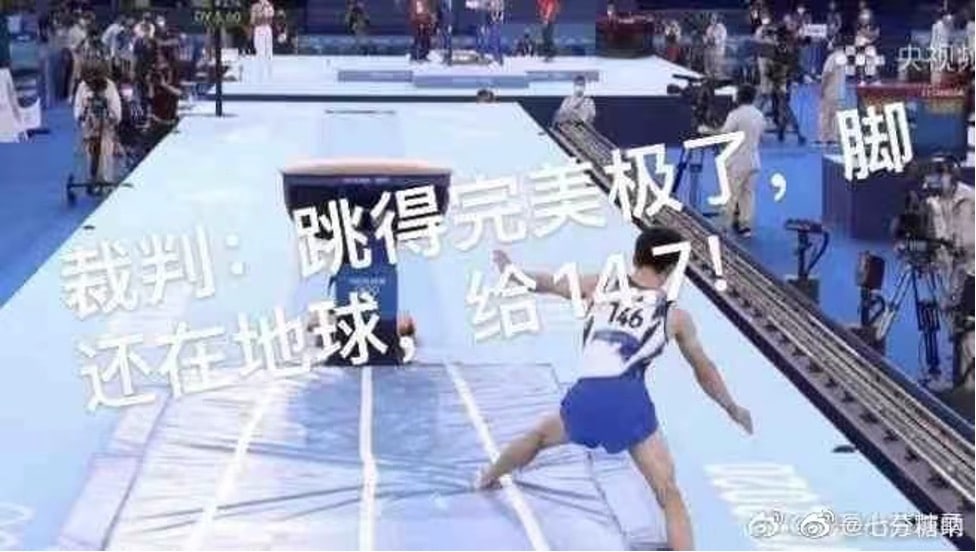
“Judge: This is perfect! The feet are still on the ground! 14.7!”
This is not the first controversy that generated heated discussions and set off a meme machine on Weibo since the Summer Olympics kicked off.
Monday’s mixed doubles table tennis final between China and Japan (Jun Mizutani/Mima Ito vs Xin Xu/Shiwen Liu) also became a major topic, especially because the Chinese players were defeated by their Japanese counterparts and won silver instead of gold. For the past 14 years, China had monopolized the gold medals in table tennis.
One moment that stood out is when Xu Xin (许昕), a Chinese professional table tennis player who is ranked world’s No. 2 for men’s singles by the International Table Tennis Federation (ITTF), entertained social media users by holding his breath immediately after he realized he was going to blow on the ping pong ball (see video here).
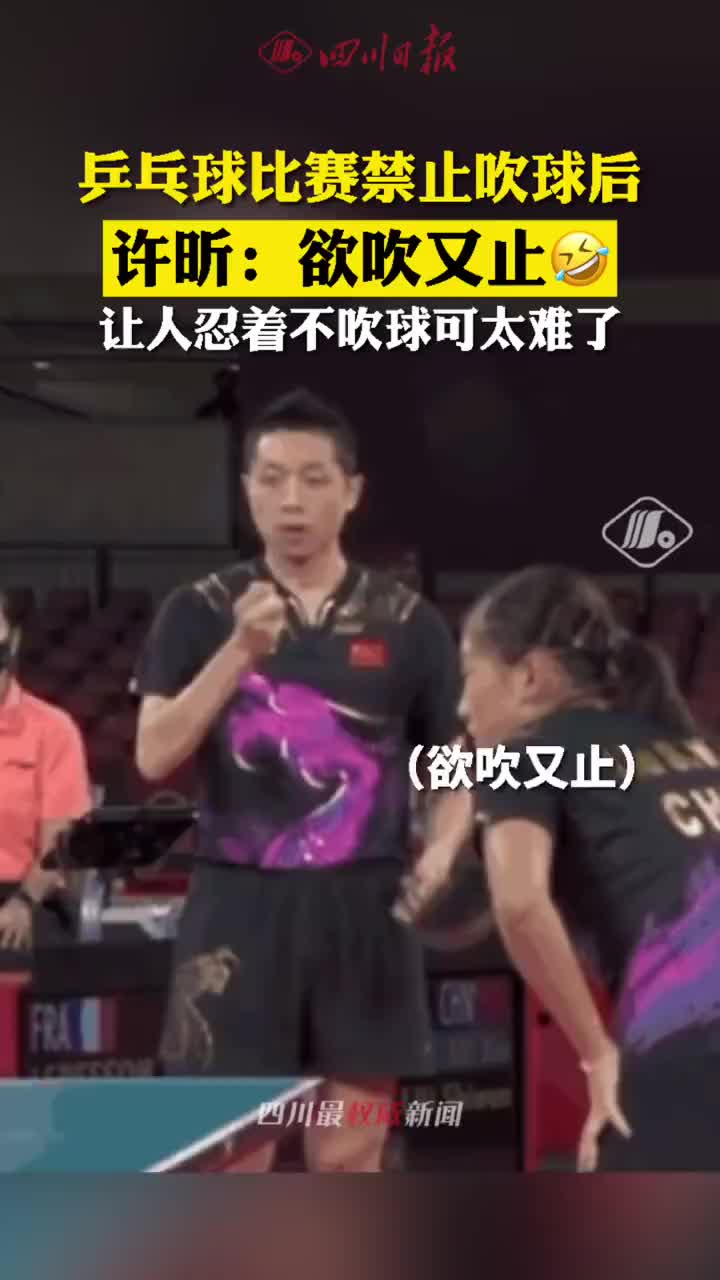
“Xu Xin Wants to Blow, Then Stops”
He did so because of the new anti-epidemic rules during the Tokyo Olympics. Some of these regulations include that players are not allowed to touch the game table with their hands and that they are not allowed to blow on the ball.
The hashtag “Xu Xin Wants to Blow, Then Stops” (#许昕欲吹又止#) that described Xu’s cautiousness went trending and generating about 450 million views on Weibo.
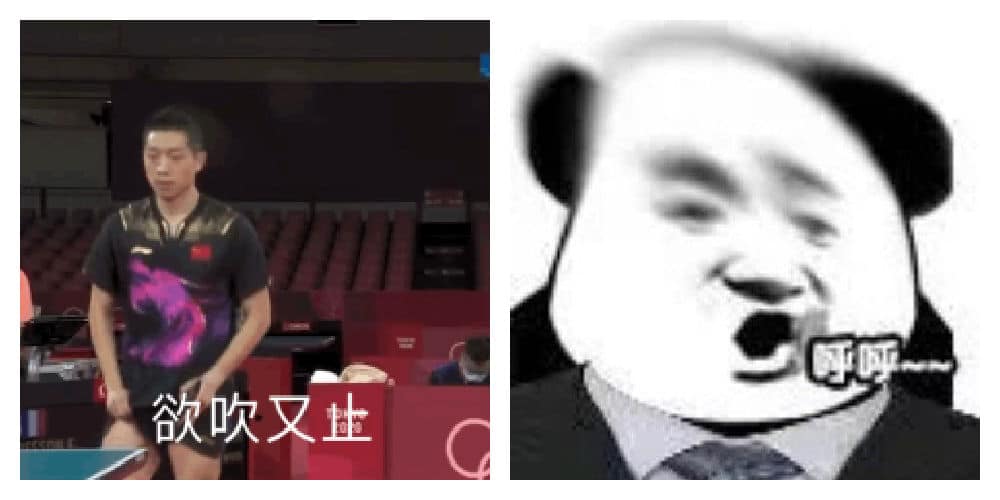
Another related hashtag is “Jun Mizutani Blows on the Ball” (#水谷隼吹球#). The hashtag is about the moment when the Japanese table tennis player blows on the ball during the event but does not receive a warning from judges (see video here). The hashtag has so far generated about 820 million views on Weibo.
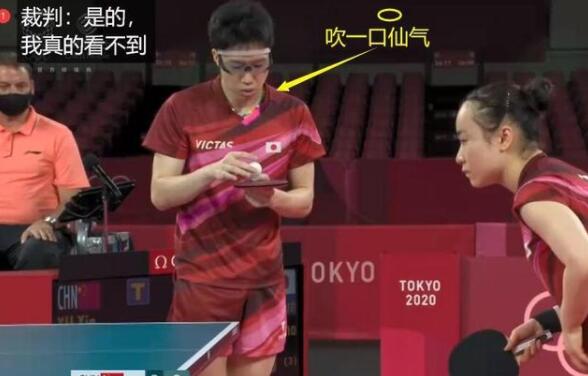
“Jun Mizutani Blows on the Ball”
Going against COVID19 regulations, Japanese table tennis player Mima Itō also touched the table several times, but the referee apparently did not notice or turned a blind eye. This also led to a Weibo hashtag page (#伊藤美诚也多次摸球桌#) and several memes.
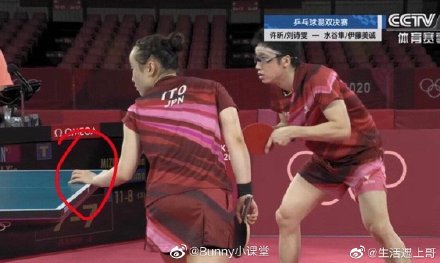
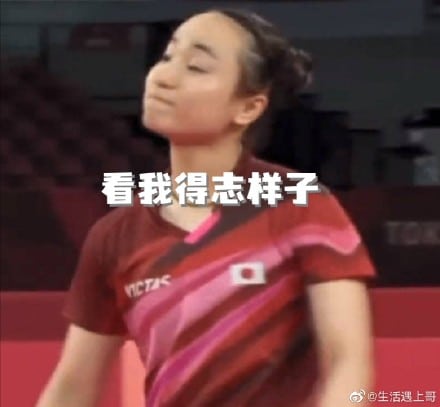
Another hashtag, “Japanese Players Swimming on the Chinese Players” (#日本选手压在中国选手身上游# ), describes another moment during the Olympics that happened during the Chinese and Japanese women’s water polo team competition on July 28, when a Chinese player was pushed underwater by a Japanese player while swimming. Some Weibo users suggested the move was dangerous and ‘could have killed’ her (see video here).
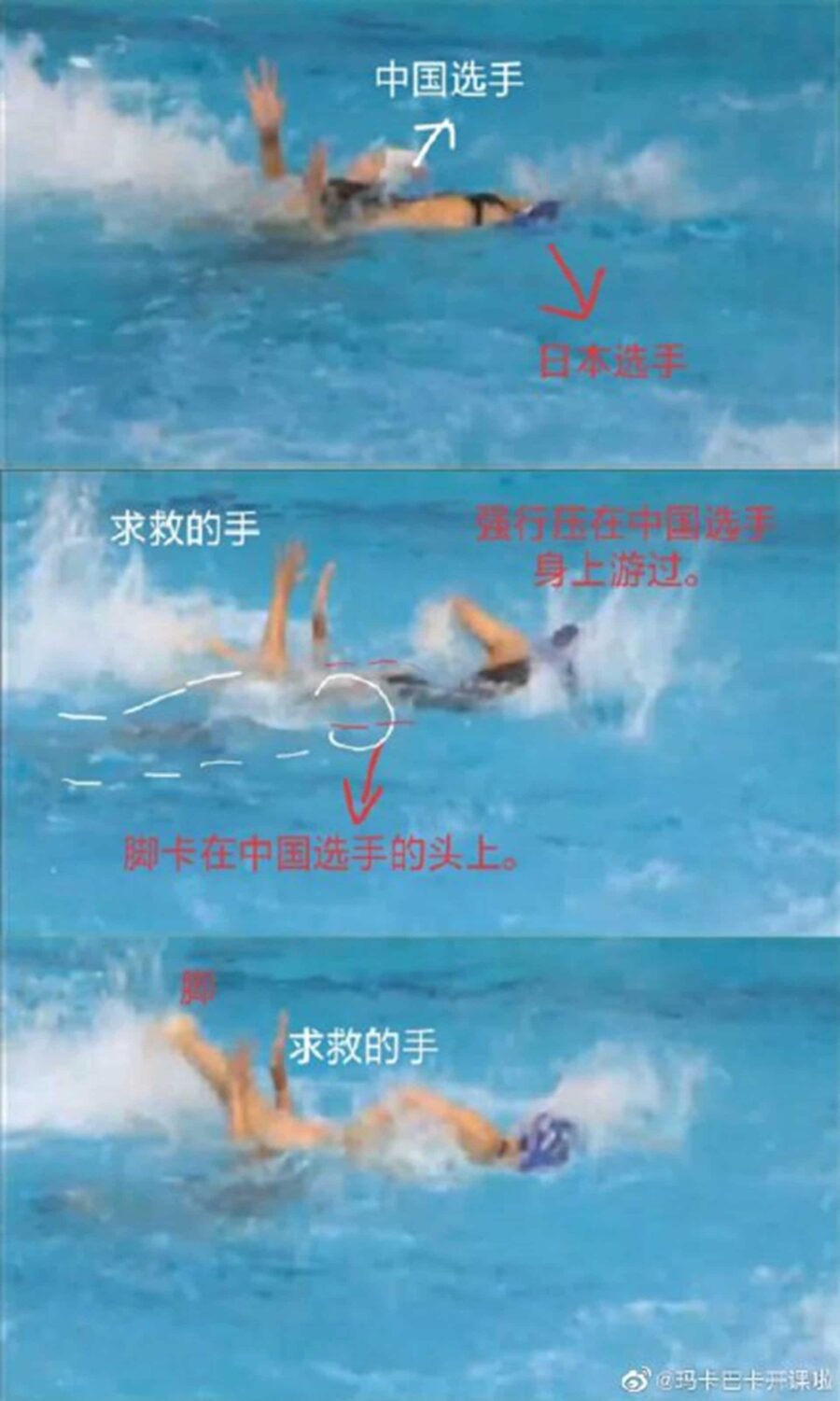

As the Games continue, the meme collections grow as online discussions are getting more intense on Weibo – especially when it comes to competitions between China and Japan.
In response to the ongoing controversies, the Central Communist Youth League of China (@共青团中央) published the video of the judges taking the Olympic oath during the opening ceremony and asked: “Have you followed your oath?”
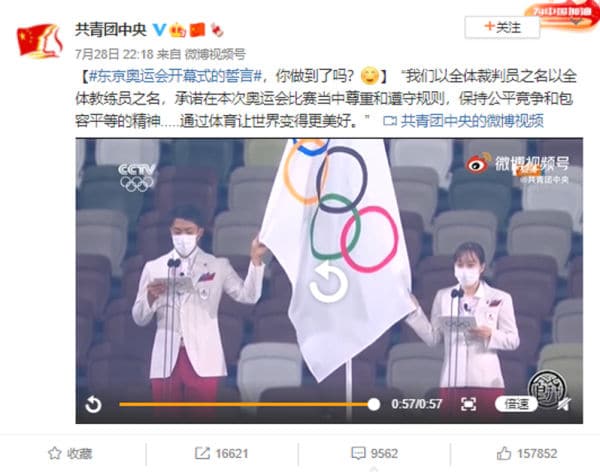
A picture of a training venue for Chinese weightlifters was widely shared on Weibo because the slogan on the wall says: “To win a clean gold medal” (#中国选手的训练场馆 拿干净金牌#).
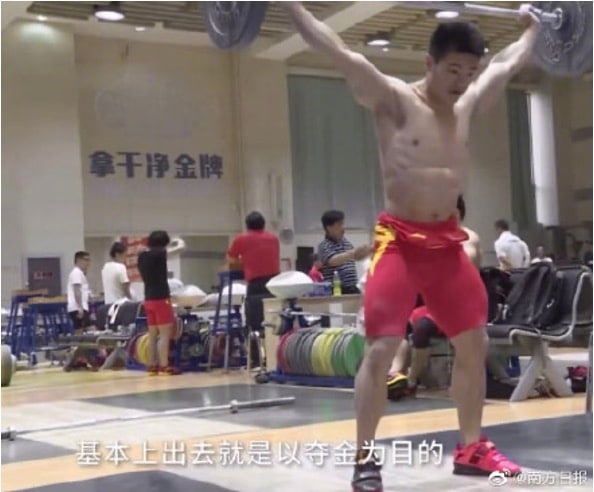
Chinese netizens applauded this principle of a ‘clean’ victory and have started to use the picture to call for fewer tricks during the rest of the Olympic competitions.
By Wendy Huang
Follow @whatsonweibo
Spotted a mistake or want to add something? Please let us know in comments below or email us. Please note that your comment below will need to be manually approved if you’re a first-time poster here.
©2021 Whatsonweibo. All rights reserved. Do not reproduce our content without permission – you can contact us at info@whatsonweibo.com
Wendy Huang is a China-based Beijing Language and Culture University graduate who currently works for a Public Relations & Media software company. She believes that, despite the many obstacles, Chinese social media sites such as Weibo can help Chinese internet users to become more informed and open-minded regarding various social issues in present-day China.

China Brands, Marketing & Consumers
Zara Dress Goes Viral in China for Resemblance to Haidilao Apron
Who’s gonna buy this Zara dress in China? “I’m afraid that someone will say I stole the apron from Haidilao.”
Published
1 week agoon
April 19, 2024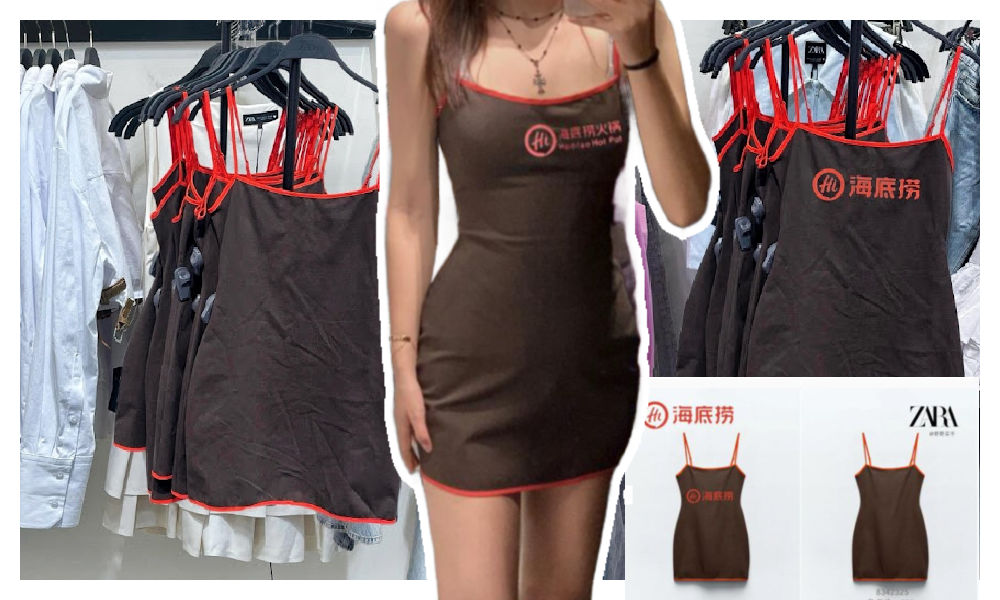
A short dress sold by Zara has gone viral in China for looking like the aprons used by the popular Chinese hotpot chain Haidilao.
“I really thought it was a Zara x Haidialo collab,” some customers commented. Others also agree that the first thing they thought about when seeing the Zara dress was the Haidilao apron.
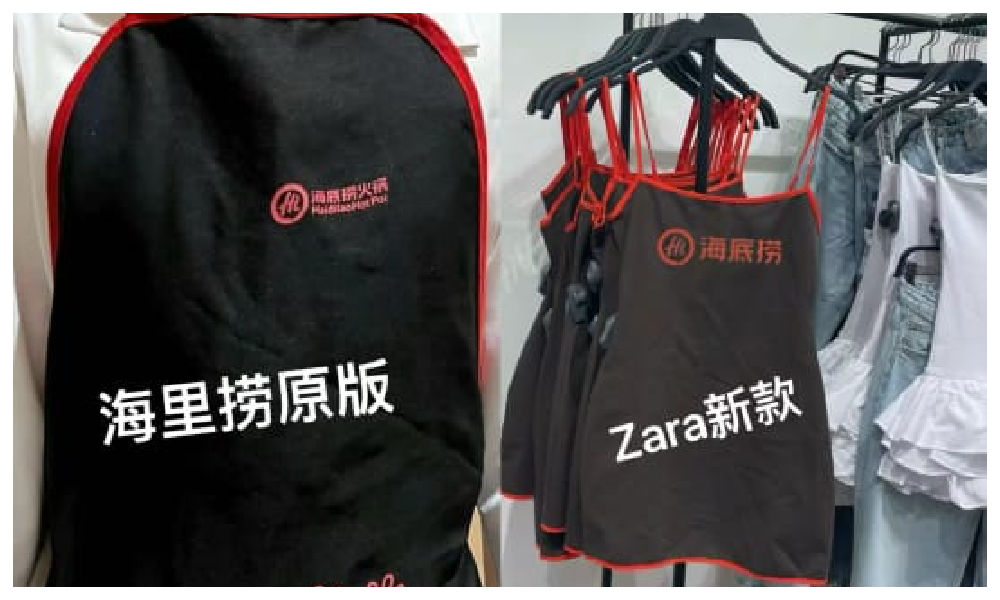
The “original” vs the Zara dress.
The dress has become a popular topic on Xiaohongshu and other social media, where some images show the dress with the Haidilao logo photoshopped on it to emphasize the similarity.

One post on Xiaohongshu discussing the dress, with the caption “Curious about the inspiration behind Zara’s design,” garnered over 28,000 replies.
Haidilao, with its numerous restaurants across China, is renowned for its hospitality and exceptional customer service. Anyone who has ever dined at their restaurants is familiar with the Haidilao apron provided to diners for protecting their clothes from food or oil stains while enjoying hotpot.
These aprons are meant for use during the meal and should be returned to the staff afterward, rather than taken home.
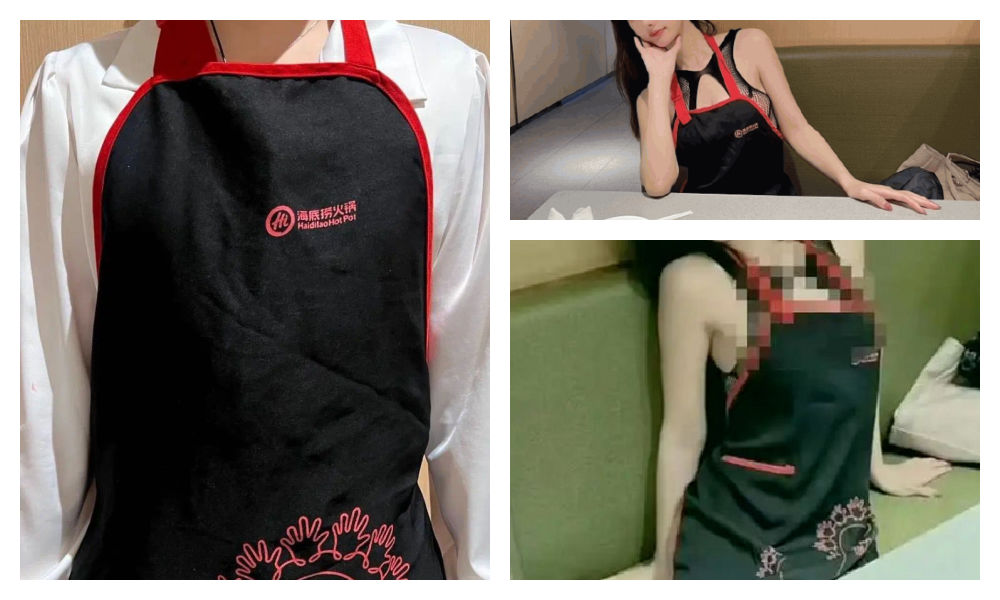
The Haidilao apron.
However, many people who have dined at Haidilao may have encountered the following scenario: after indulging in drinks and hotpot, they realize they are still wearing a Haidilao apron upon leaving the restaurant. Consequently, many hotpot enthusiasts may have an ‘accidental’ Haidilao apron tucked away at home somewhere.
This only adds to the humor of the latest Zara dress looking like the apron. The similarity between the Zara dress and the Haidilao apron is actually so striking, that some people are afraid to be accused of being a thief if they would wear it.
One Weibo commenter wrote: “The most confusing item of this season from Zara has come out. It’s like a Zara x Haidilao collaboration apron… This… I can’t wear it: I’m afraid that someone will say I stole the apron from Haidilao.”

Funnily enough, the Haidilao apron similarity seems to have set off a trend of girls trying on the Zara dress and posting photos of themselves wearing it.
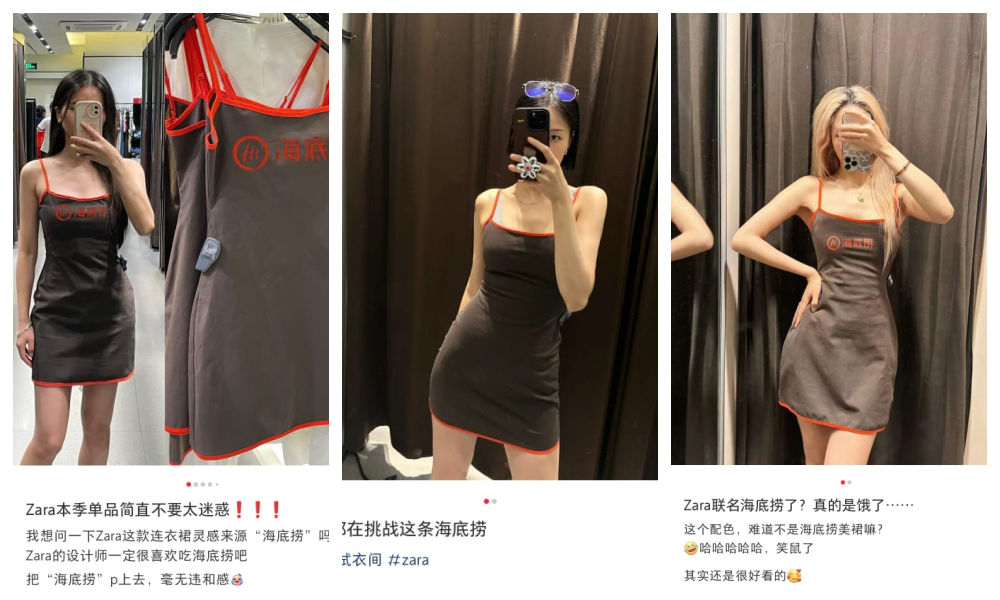
It’s doubtful that they’re actually purchasing the dress. Although some commenters say the dress is not bad, most people associate it too closely with the Haidilao brand: it just makes them hungry for hotpot.
By Manya Koetse
Independently reporting China trends for over a decade. Like what we do? Support us and get the story behind the hashtag by subscribing:
Spotted a mistake or want to add something? Please let us know in comments below or email us. First-time commenters, please be patient – we will have to manually approve your comment before it appears.
©2024 Whatsonweibo. All rights reserved. Do not reproduce our content without permission – you can contact us at info@whatsonweibo.com.
China Memes & Viral
Chengdu Disney: The Quirkiest Hotspot in China
How a senior activity park in Chengdu was ‘Disneyfied’ and became a viral hotspot.
Published
2 weeks agoon
April 12, 2024
How did a common park turn into a buzzing hotspot? By mixing online trends with real-life fun, blending foreign styles with local charm, and adding a dash of humor and absurdity, Chengdu now boasts its very own ‘Chengdu Disney’. We explain the trend.
– By Manya Koetse, co-authored by Ruixin Zhang
Have you heard about Chengdu Disney yet? If not, it’s probably unlike anything you’d imagine. It’s not actually a Disney theme park opening up in Chengdu, but it’s one of the city’s most viral hotspots these days.
What is now known as ‘Chengdu Disney’ all over the Chinese internet is actually a small outdoor park in a residential area in Chengdu’s Yulin area, which also serves as the local senior fitness activity center.
Crowds of young people are coming to this area to take photos and videos, hang out, sing songs, cosplay, and be part of China’s internet culture in an offline setting.
Once Upon a Rap Talent Show
The roots of ‘Chengdu Disney’ can be traced back to the Chinese hip-hop talent show The Rap of China (中国新说唱), where a performer named Nuomi (诺米), also known as Lodmemo, was eliminated by Chinese rapper Boss Shady (谢帝 Xièdì), one of the judges on the show.
Nuomi felt upset about the elimination and a comment made by his idol mentor, who mistakenly referred to a song Nuomi made for his ‘grandma’ instead of his grandfather. His frustration led to a viral livestream where he expressed his anger towards his participation in The Rap of China and Boss Shady.
However, it wasn’t only his anger that caught attention; it was his exaggerated way of speaking and mannerisms. Nuomi, with his Sichuan accent, repeatedly inserted English phrases like “y’know what I’m saying” and gestured as if throwing punches.
His oversized silver chain, sagging pants, and urban streetwear only reinforce the idea that Nuomi is trying a bit too hard to emulate the fashion style of American rappers from the early 2000s, complete with swagger and street credibility.

Lodmemo emulates the style of American rappers in the early 2000s, and he has made it his brand.
Although people mocked him for his wannabe ‘gangsta’ style, Nuomi embraced the teasing and turned it into an opportunity for fame.
He decided to create a diss track titled Xiè Tiān Xièdì 谢天谢帝, “Thank Heaven, Thank Emperor,” a word joke on Boss Shady’s name, which sounds like “Shady” but literally means ‘Thank the Emperor’ in Chinese. A diss track is a hip hop or rap song intended to mock someone else, usually a fellow musician.
In the song, when Nuomi disses Boss Shady (谢帝 Xièdì), he raps in Sichuan accent: “Xièdì Xièdì wǒ yào diss nǐ [谢帝谢帝我要diss你].” The last two words, namely “diss nǐ” actually means “to diss you” but sounds exactly like the Chinese word for ‘Disney’: Díshìní (迪士尼). This was soon picked up by netizens, who found humor in the similarity; it sounded as if the ‘tough’ rapper Nuomi was singing about wanting to go to Disney.

Nuomi and his diss track, from the music video.
Nuomi filmed the music video for this diss track at a senior activity park in Chengdu’s Yulin subdistrict. The music video went viral in late March, and led to the park being nicknamed the ‘Chengdu Disney.’
The particular exercise machine on which Nuomi performed his rap quickly became an iconic landmark on Douyin, as everyone eagerly sought to visit, sit on the same see-saw-style exercise machine, and repeat the phrase, mimicking the viral video.

What began as a homonym led to people ‘Disneyfying’ the park itself, with crowds of visitors flocking to the park, some dressed in Disney-related costumes.

This further developed the concept of a Chengdu ‘Disney’ destination, turning the park playground into the happiest place in Yulin.
Chengdu: China’s Most Relaxed Hip Hop Hotspot
Chengdu holds a special place in China’s underground hip-hop scene, thanks to its vibrant music culture and the presence of many renowned Chinese hip-hop artists who incorporate the Sichuan dialect into their songs and raps.
This is one reason why this ‘Disney’ meme happened in Chengdu and not in any other Chinese city. But beyond its musical significance, the playful spirit of the meme also aligns with Chengdu’s reputation for being an incredibly laid-back city.
In recent years, the pursuit of a certain “relaxed feeling” (sōngchígǎn 松弛感) has gained popularity across the Chinese internet. Sōngchígǎn is a combination of the word for “relaxed,” “loose” or “lax” (松弛) and the word for “feeling” (感). Initially used to describe a particular female aesthetic, the term evolved to represent a lifestyle where individuals strive to maintain a relaxed demeanor, especially in the face of stressful situations.
🌟 Attention!
For 11 years, What’s on Weibo has remained a 100% independent blog, fueled by my passion to write about China’s digital culture and online trends. Over a year ago, we introduced a soft paywall to ensure the sustainability of this platform. I’m grateful to all our loyal readers who’ve subscribed since 2022. Your support has been invaluable. But we need more subscribers to continue our work. If you appreciate our content and want to support independent China reporting, please consider becoming a subscriber. Your support keeps What’s on Weibo going strong!
The concept gained traction online in mid-2022 when a Weibo user shared a story of a family remaining composed when their travel plans were unexpectedly disrupted due to passport issues. Their calm and collected response inspired the adoption of the “relaxed feeling” term (also read here).
Central to embodying this sense of relaxation is being unfazed by others’ opinions and avoiding unnecessary stress or haste out of fear of judgment.
Nowadays, Chinese cities aim to foster this sense of sōngchígǎn. Not too long ago, there were many hot topics suggesting that Chengdu is the most sōngchí 松弛, the most relaxed city in China.
This sentiment is reflected in the ‘Chengdu Disney’ trend, which both pokes fun at a certain hip-hop aesthetic deemed overly relaxed—like the guys who showed up with sagging pants—and embraces a carefree, childlike silliness that resonates with the city’s character and its people.

Mocking sagging pants at ‘Chengdu Disney.’
Despite the influx of visitors to the Chengdu Disney area, authorities have not yet significantly intervened. Community notices urging respect for nearby residents and the presence of police officers to maintain order indicate a relatively hands-off approach. For now, it seems most people are simply enjoying the relaxed atmosphere.
Being Part of the Meme
An important aspect that contributes to the appeal of Chengdu Disney is its nature as an online meme, allowing people to actively participate in it.

Scenes from Chengdu Disney, images via Weibo.
China has a very strong meme culture. Although there are all kinds of memes, from visual to verbal, many Chinese memes incorporate wordplay. In part, this has to do with the nature of Chinese language, as it offers various opportunities for puns, homophones, and linguistic creativity thanks to its tones and characters.
The use of homophones on Chinese social media is as old as Chinese social media itself. One of the most famous examples is the phrase ‘cǎo ní mǎ’ (草泥马), which literally means ‘grass mud horse’, but is pronounced in the same way as the vulgar “f*ck your mother” (which is written with three different characters).
In the case of the Chengdu Disney trend, it combines a verbal meme—stemming from the ‘diss nǐ’ / Díshìní homophone—and a visual meme, where people gather to pose for videos/photos in the same location, repeating the same phrase.
Moreover, the trend bridges the gap between the online and offline worlds, as people come together at the Chengdu playground, forming a tangible community through digital culture.
The fact that this is happening at a residential exercise park for the elderly adds to the humor: it’s a Chengdu take on what “urban” truly means. These colorful exercise machines are a common sight in Chinese parks nationwide and are actually very mundane. Transforming something so normal into something extraordinary is part of the meme.

A 3D-printed model version of the exercise equipment featured in Nuomi’s music video.
Lastly, the incorporation of the Disney element adds a touch of whimsy to the trend. By introducing characters like Snow White and Mickey Mouse, the trend blends American influences (hip-hop, Disney) with local Chengdu culture, creating a captivating and absurd backdrop for a viral phenomenon.
For some people, the pace in which these trends develop is just too quick. On Weibo, one popular tourism blogger (@吴必虎) wrote: “The viral hotspots are truly unpredictable these days. We’re still seeing buzz around the spicy hot pot in Gansu’s Tianshui, meanwhile, a small seesaw originally meant for the elderly in a residential community suddenly turns into “Chengdu Disneyland,” catching the cultural and tourism authorities of Sichuan and even Shanghai Disneyland off guard. Netizens are truly powerful, even making it difficult for me, as a professional cultural tourism researcher, to keep up with them.”
By Manya Koetse, co-authored by Ruixin Zhang
Independently reporting China trends for over a decade. Like what we do? Support us and get the story behind the hashtag by subscribing:
Spotted a mistake or want to add something? Please let us know in comments below or email us. First-time commenters, please be patient – we will have to manually approve your comment before it appears.
©2024 Whatsonweibo. All rights reserved. Do not reproduce our content without permission – you can contact us at info@whatsonweibo.com.
Subscribe

Weibo Watch: The Battle for the Bottom Bed

Zara Dress Goes Viral in China for Resemblance to Haidilao Apron

“Old Bull Eating Young Grass”: 86-Year-Old Chinese Painter Fan Zeng Marries 36-Year-Old Xu Meng

Chengdu Disney: The Quirkiest Hotspot in China

Where to Eat and Drink in Beijing: Yellen’s Picks

The ‘Two Sessions’ Suggestions: Six Proposals Raising Online Discussions

Top 9 Chinese Movies to Watch This Spring Festival Holiday

Party Slogan, Weibo Hashtag: “The Next China Will Still Be China”

From Pitch to Politics: About the Messy Messi Affair in Hong Kong (Updated)

“Old Bull Eating Young Grass”: 86-Year-Old Chinese Painter Fan Zeng Marries 36-Year-Old Xu Meng

Looking Back on the 2024 CMG Spring Festival Gala: Highs, Lows, and Noteworthy Moments

Two Years After MU5735 Crash: New Report Finds “Nothing Abnormal” Surrounding Deadly Nose Dive

More than Malatang: Tianshui’s Recipe for Success

Chengdu Disney: The Quirkiest Hotspot in China

In Hot Water: The Nongfu Spring Controversy Explained
Get in touch
Would you like to become a contributor, or do you have any tips or suggestions? Get in touch here!
Popular Reads
-

 China Insight2 months ago
China Insight2 months agoThe ‘Two Sessions’ Suggestions: Six Proposals Raising Online Discussions
-

 China Arts & Entertainment3 months ago
China Arts & Entertainment3 months agoTop 9 Chinese Movies to Watch This Spring Festival Holiday
-

 China Media2 months ago
China Media2 months agoParty Slogan, Weibo Hashtag: “The Next China Will Still Be China”
-
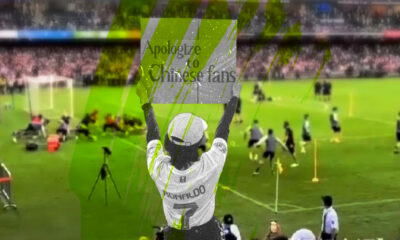
 China World2 months ago
China World2 months agoFrom Pitch to Politics: About the Messy Messi Affair in Hong Kong (Updated)

